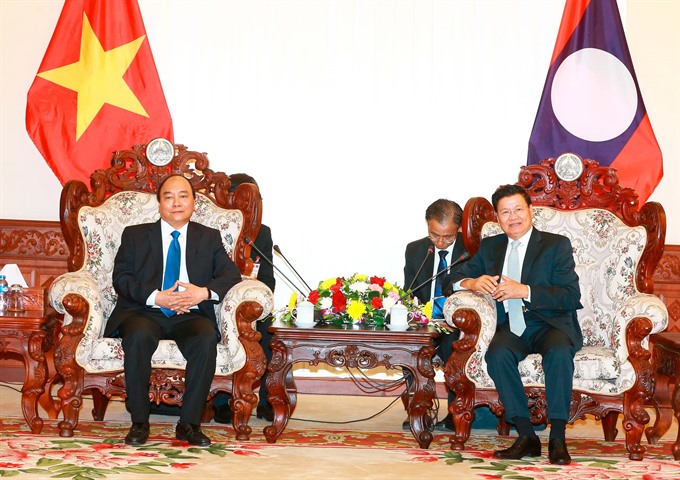 Politics & Law
Politics & Law

Prime Minister Nguyễn Xuân Phúc and his Lao counterpart Thongloun Sisoulith have agreed to give the top priority to nurturing the bilateral traditional friendship and special solidarity, regarding this as a vital and decisive factor to ensure the victory of each country’s revolutionary cause.
 |
| Prime Minister Nguyễn Xuân Phúc (left) meets with his Lao counterpart Thongloun Sisoulith in Vientiane during his first visit to the country as the Vietnamese PM. - VNA/VNS Photo Thống Nhất |
VIENTIANE – Prime Minister Nguyễn Xuân Phúc and his Lao counterpart Thongloun Sisoulith yesterday agreed to accord top priority to nurturing ties of traditional friendship and special solidarity, saying this would be decisive in ensuring victory of either country’s revolutionary cause.
The consensus was reached in talks in Vientiane on the occasion of Phúc’s first official visit to Laos as Vietnamese Prime Minister.
The two leaders also agreed that high-level agreements, especially the Joint Statement issued on the official visit to Laos by Việt Nam’s Party General Secretary Nguyễn Phú Trọng in November 2016 and the Joint Statement released during the visit to Việt Nam by Laos’s Party General Secretary and President Bounnhang Vorachith last year, would be implemented more effectively.
They pledged to build on the outcomes gained at the 39th meeting of the Việt Nam-Laos Intergovernmental Committee on bilateral co-operation and to strive their utmost in carrying out the Việt Nam-Laos bilateral co-operation agreement during the 2016-2020 five-year period.
The Vietnamese and Lao governments will map out long-term orientations to collaborate for sustainable development of bilateral relations, increasing economic and trade ties while ensuring social welfare and environmental protection, the leaders said.
They also agreed to enhance high-level delegation exchanges and effectively deploy bilateral co-operation mechanisms in politics, external affairs, security-defence, trade and investment.
The two sides are aiming to increase two-way trade value in 2017 by 10 per cent year-on-year and step up economic connectivity, particularly in energy and transport.
Agreements signed by both sides, particularly the protocol on co-operation in defence and security for 2016-2020, the protocol on border line and national border markers, the agreement on border and border gate management regulations, and the agreement on building Vientiane-Paksan-Thanh Thủy-Hà Nội highway, will be implemented efficiently, the premiers said.
They also agreed to enhance cultural and people-to-people exchanges and jointly organise activities to celebrate the 55th anniversary of diplomatic ties and the 40th anniversary of signing the Việt Nam-Laos Treaty of Friendship and Co-operation.
PM Phúc presented his Lao counterpart and the Lao people with copies of Vietnamese-Lao and Lao-Vietnamese dictionaries symbolising mutual understanding.
They two leaders saw co-operation in education and training as a bright spot in bilateral co-operation, and affirmed that this would be stepped up in the future.
They also agreed to strengthen co-ordination at regional and international forums like the United Nations, the Association of Southeast Asian Nations (ASEAN), and sub-regional co-operation mechanisms, as well as support each other’s initiatives and activities within the framework of ASEAN.
They also said that they would step up co-operation with each other and with other countries and international organisations for sustainable and effective use and management of water resources in the Mekong River.
This was important for ensuring mutual benefit of countries in the Mekong basin, especially downstream nations. They noted the need to develop mechanisms for bilateral co-ordination as well as co-ordination with other stakeholders for assessing and monitoring the impacts of the use of river water resources.
The two sides also stressed the importance of maintaining peace, stability, security, safety and freedom of navigation and aviation in the East Sea (South China Sea); settling disputes via peaceful means and international law, including the 1982 United Nations Convention on the Law of the Sea (UNCLOS); implementing fully and effectively the Declaration on the Conduct of Parties in the East Sea (DOC), and reaching soon a framework for the Code of Conduct in the East Sea (COC).
They said they looked forward to finalizing the COC in mid-2017, thus contributing to peace, security, stability, co-operation and development in the region and in the world.
A Joint Statement was issued by both nations to mark the visit of the Vietnamese PM.
Phúc on the same day met with Laos’ Party General Secretary and President Bounnhang Vorachith, the National Assembly Chairwoman Pany Yathoutu and Vice President Phankham Viphavan.
VN-Laos Friendship Year
Prime Ministers Nguyễn Xuân Phúc and Thongloun Sisoulith yesterday launched the Việt Nam-Laos Solidarity and Friendship Year 2017 in Vientiane.
The event is part of activities celebrating 55 years of diplomatic relations and the 40th anniversary of the Việt Nam-Laos Treaty of Friendship and Co-operation.
Lao PM Sisoulith said the launch of the Việt Nam-Laos Solidarity and Friendship Year 2017 declared to the world the importance of the friendship, special solidarity and comprehensive co-operation between the two countries.
The special relationship was established by late Presidents Hồ Chí Minh, Kaysone Phomvihane and Souphanouvong, and have been nurtured by generations of Vietnamese and Lao people, he said.
He noted that bilateral ties have grown steadily since the establishment of diplomatic ties, especially since the signing of the treaty in 1977.
The ties have been fruitful in many areas, bring practical benefits for both peoples, he added.
Locality-to-locality connections have also been strengthened, helping boost trade and investment ties, he said.
PM Phúc described the Solidarity and Friendship Year as a milestone marking a great stride in the two countries’ special relations.
“What they have achieved is a priceless asset created by generations of Vietnamese and Lao leaders and people,” he stressed.
He voiced his belief that joint efforts will successfully contribute to the “forever green and forever sustainable” friendship and solidarity between the two nations.
Both leaders said they believe practical and meaningful celebrations during the year would intensify bilateral ties and help educate people, especially the young, on the special relationship enjoyed by both countries. – VNS




